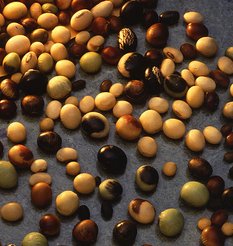Soybean, yellow

  | Soybean, yellow in TCM:Explore the properties of Soybean, yellow according to Chinese
Nutrition and Traditional Chinese Medicine (TCM):
Temperature: cool
Channels: LU, LI, ST, SP
Flavors: sweet
Tonifies: qi, blood
Special Properties:
clears heat, eliminates toxins, resolves dryness
In terms of Traditional Chinese Medicine (TCM) Yellow Soybeans are known for their ability to tonify qi and blood. They also help to clear heat, eliminate toxins, and lubricate the lungs[22].
In general the ancient Chinese medical texts cite that they enter the Stomach, Spleen, and Large Intestine. Some sources indicate that soy beans enter the lungs[22]. Like all legumes listed in the beans category the flavor of Yellow Soybeans is sweet, and they are considered to be cool in temperature.
Editors Note: As of 2015 90% of all soybeans grown in the US were made from genetically modified GMO round-up-ready varieties. GMO soy may erase all of the health benefits traditionally associated with consuming soy since some studies show it to have 98% less vitamins and nutrients as well as toxic chemicals such as glyphosate. The editor advises the reader to consume and purchase only certified non-GMO soy varieties.
Traditionally non-GMO soy beans are considered to be very healthy in Chinese medicine. 100 grams of soybeans include 36.3g of highly nutritious animal like protein, 25.3g of carbohydrates, 18.4g of easily digestible non-saturated fats, 412 calories, 5g of fiber, 564mg calcium, 571 mg phosphorous, 11mg of iron, as well as small amounts of carotin, vitamin B2, and nicotinic acid. One pound of soybeans contains as much protein as 2 pounds of lean meat!
In Chinese medicine soybeans have long been regarded as an herb capable of healing many diseases including edema, common cold, skin sores, diarrhea, habitual constipation, iron-deficiency anemia, leg ulcers and complications of pregnancy (such as vomiting, atrophy of the liver, and renal failure). When the great herbalist Shen-Chen Li published his famous book An Outline of Materia Medica he recommended soybeans as an effective remedy for "kidney diseases, water retention, and poisoning". Chinese farmers also feed soybeans to cows to promote lactation, and humans may benefit by frying soybeans and then steaming them with turnips and fresh ginger to promote lactation.
Soybeans can help to resolve conditions related to heat in the lung and stomach such as dry skin, intense appetite, ulcers in the mouth or stomach, gingivitis, diarrhea, and constipation. To help resolve heat conditions in general drink soymilk or eat tofu regularly. For diarrhea charcoal soybeans, grind into a powder, and take 1 teaspoon 3x per day. For habitual constipation boil tea from soybeans and drink 4x per day. [22]
Soymilk is easy to make by blending soaked soybeans with a larger volume of water. Strain off the milk and boil it for about twenty minutes - then sweeten to taste. [22]
To make tofu curdle the soymilk with calcium sulfate, nigari, or lemon juice. Strain and press the solids into a block.[22]
Fermented soybeans are a Chinese herb [See also: Dan Dou Chi]
Aduki beans and soybeans are both commonly consumed as food, and concentrated forms of these legumes are also used in Chinese herbal medicine.
Regular soybeans can be found at
[See Also: Soybeans] while fermented soybeans
(aka Tofu)
[See also: Tofu] matches more closely with the Chinese herbal therapy of the use of soybeans to improve health. The Chinese herbal remedy Chi Xiao Dou, which is a more concentrated form of fermented soybean, is available as an herbal powder on popular web sites like Amazon.com.
The fact that
fresh soybean,
fermented soybean (tofu),
and concentrated fermented soybean powder
(Chi Xiao Dou) affect the body in different ways is a testament to the fact that cooking and preparation methods can dramatically change the properties of herbs and foods.
[See Also: Food preparation in Chinese medicine]
Disclaimer: In accordance with our terms of service, by using this web site you agree that none of the information found on this web site constitutes medical advice. You should always consult your doctor before trying any particular food or herbal remedy to treat disease.
Folk remedies presented on this site are designed to address specifc TCM diagnoses, and are not one-size-fits-all. If you would like to learn more about Traditional Chinese Medicine (TCM) and how it relates to Chinese Nutrition, you can book in a free call with a licensed professional. There is no obligation to purchase.
[CLICK HERE for your free INITIAL CONSULTATION] |

